仁爱版九上英语u2t1sb
仁爱英语九年级u2t1sb

0. (can't) stand sb./sth. doing sth. (无法)忍受某人/某物做某事*11. breathe in/out 吸入/呼出*12. breathe hard/with difficulty 呼吸困难13. take (a) (deep) breath(s) (深深地)吸(一)口气14. waste paper 废纸15. anyway = anyhow = in any wise 无论如何,不管怎样16. produce terrible gas 制造糟糕的煤气、气体(废气)17. make sb./sth. +动词原形/adj. 让某人/某物……样18. be in/having a bad mood 心情差,处在不好的情绪中19. had better do sth. 最好做某事20. go to see a doctor 去看医生21. write to... 写信给……1、The chemical factory produces terrible gas.化工厂向外排放难闻的气体 Produce 动词 生产、出产、制造,如: Australia produces wool and meat. 澳大利亚盛产羊毛和肉 Labour produces wealth. 劳动创造财富2、I can ’t stand the environment here. 我不能忍受这样的环境 Stand 动词 忍受 Stand+n./pron. 忍受....如: The boy is too impolite.we should ’t stand him any more 这男孩太没礼貌了,我们不能忍受他了。
3、anyway ,I hope the government will solve this problem soon. 无论如何,我希望政府不久会解决这个问题。
仁爱九年级英语上册Unit1 Topic2SectionB 精品
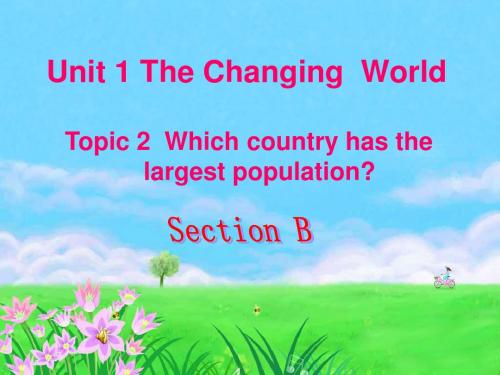
6, 800,000,000
What a large population!
80 80 80
The population is increasing by 80 million every year.
Watch and answer
(视频p11-1a)
1. Which countries have larger population, developing countries or developed countries?
A:China … carry out … control the population.
Mount Qomolangma
Canada
1. 1.3 billion
2. 6 __________ 575(miles)
844.43(meters) 3. 8 __________
4. __________ 32 million
… 80 million every year. B:Which country …?
A:China … with…,
and India …with …. B:… the U.S.A.? A:296 million. B:It shows … developing countries … developed countries. A:… grow faster … B:So it is. The population problem … developing countries
十亿
one thousand
1,000,000 1.34
one million
one point three four
点
(录音p12-2a )
仁爱英语九上教案新部编本U1T2SB
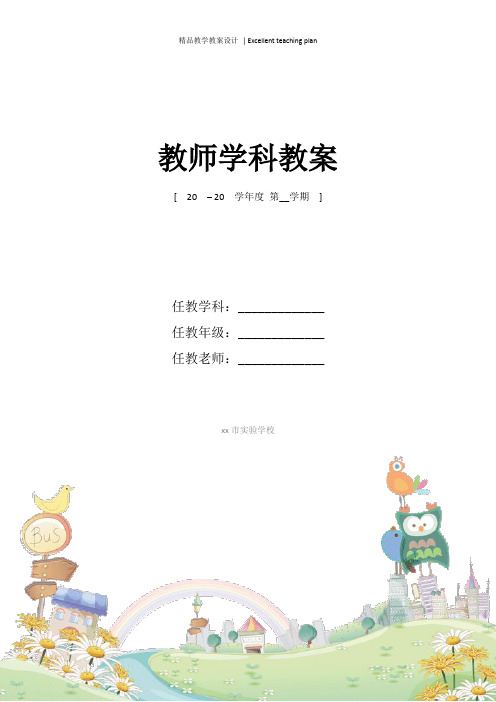
教师学科教案[ 20 – 20 学年度第__学期]任教学科:_____________任教年级:_____________任教老师:_____________xx市实验学校Section BⅠ. Material analysis本课是九年级第一单元第二话题的第二课时,主活动是1a和2。
本课通过谈论各国的人口数量,复习比较级的基本句型,学习高位数的表达。
1b通过连线题,训练学生听懂高位数的能力。
1c通过把对话转换为段落来巩固1a的内容。
2重点学习高位数的读法。
3让学生通过读图来操练高位数的读法。
为了降低1a 和3的难度,建议将2调整到1a前,作为一个读前的活动。
通过谈论各国人口的现状,引导学生树立正确的人口观念。
Ⅱ.Teaching aims1.Knowledge aims:掌握本课的重点词汇和短语,复习形容词比较级的用法,继续学习数字表达。
2.Skill aims:能听懂高位数字,并作出正确判断。
能通过整合对话内容,提升综合语言运用能力。
3.Emotional aims: (optional)增强学生对人口问题的认识,了解各国的人口现状。
增强学生关注社会的意识。
4.Culture awareness: (optional)通过对比发达国家和发展中国家的人口增长情况,引导学生树立正确的人口观念。
Ⅲ. The key points and difficult points1. Key points:Words and phrases: population, billion, increase, reach, Russia, luckily, policy, measurein deve loped/ developing countries, have a population of…, increase by, carry out, the one-child policySentences: (1) It says the world has a population of 6.8 billion.(2) It is increasing by 80 million every year.(3) Which country has the largest population?(4) —What’s the population of the USA.?—It’s…(5) So it is.(6) The population problem is more serious in developing countries. Grammar: Go on learning and using Present Perfect.2. Difficult points:能更快更好的听懂和朗读高位数字。
初中英语仁爱版九年级上册Unit2Topic1知识点

初中英语仁爱版九年级上册Unit2Topic1知识点Unit2 Topic1Section A1.gone(不及物动词)不复存在,不见了,丢失,失窃2.XXX有某人或某物正在做某事Eg:There are some boys running on the playground.有一些男孩正在操场上跑步。
XXX.有某人/某物做某事Eg:There is no time to think.没有时间去想了。
3.pour...into...把...倒入...4.waste(形容词)废弃的,丢弃的,无用的(名词)废弃物,废料(动词)浪费waste of time浪费时间waste of money浪费金钱Section B1.It’s difficult for sb. to do sth.做某事对某人来说很困难2.howlong多久,多长时间,用来询问或谈论某段时间,答语通常用for,since等引导的时间状语,谓语动词必须为延续性动词。
—How long have you learned English?—I have learned English for three years.3.in a bad mood不爽,心情不好。
4.bear(动词)忍受,蒙受(名词)熊,鲁莽的人XXX 忍受...,对...有耐烦Eg:Please bear with me while I ask some questions.当我发问你时,请耐烦些。
作动词时常能够stand交换,stand蒙受,禁受;忍受,容忍,常与can,could 1连用。
stand+名词/代词/doing:忍受某人/某事/做某事I can’t stand working in an offic e.我几乎受不了在办公室工作。
5.anyway不管如何,使用时常常位于句子开头迁移转变处。
6.write to写信给...Section C1.be harmful to =do harm to =be bad for对...有害harm sb./sth.伤害某人/某物Reading in the sun is XXX在太阳底下读书对眼睛有害。
Unit 2 Topic 1 Section B-九年级英语上册(仁爱版)

3. in a bad mood 心情差 in a good mood 心情好
翻译句子: 我今天心情不好。
I am __i_n__ __a___ __b_a_d___ __m_o_o_d___today. 他今天心情好。He __is__ _i_n__ _a__ __g_o_o_d__ __m_o_o_d_ today.
lights at night, we waste energy. 5. _________ makes a mess of our environment, /so people shouldn’t
throw it around.
Have you ever had a picnic?
Have you ever had a picnic?
(Mrs. Zhou meets Kangkang on the street. She looks good.) Kangkang: Good morning, Mrs. Zhou.
How have you been? Mrs. Zhou: Oh, Kangkang. I’m OK.
I have coughed less. You know I hHaadveayopuaeivnerihnadma ypictnhicr?oat before. It was difficult for me to breathe. Kangkang: What caused your cough? Mrs. Zhou: The chemical factory produced terrible gas before, and the bad air made my chest hurt. What was worse, the factory made too much noise and I couldn’t sleep well at night.
仁爱版英语九年级上册 Unit2 课文挖空 B 层 (无答案)

U2 T1 SA--- B层: Kangkang, where shall we go?: What about the west hill? I 1._______ (go) there two years ago. It was a beautiful place. There were lots of flowers and grass. The air was fresh and the water was clean, and you could see bees and butterflies2. _________(dance).: Sounds great! Let’s go there.(3._____ Sunday, they come to the West Hill.): Oh, 4. ______________________(真是脏乱!)! The flowers and grass have 5._______(不见了)! The water is so dirty. It 6.______________ (闻起来很臭). What has happened here?: 7.______________________(真遗憾)! Look, there are several chemical factories 8 __________ (pour) waste water into the stream.: Everything has 9__________ (change).: Do you still want to 10________________ (野餐) here?: Of course not.U2 T1 SB --- B层(Mrs. Zhou is coughing. She 1.___________________ (看起来虚弱).): Good moring, Mrs. Zhou. 2. ___________________________________?(你怎么了?): Oh, Kangkang. It’s difficult for me to 3. ___________[briːð]. I’ve got a 4.________ /pein/ in my throat.: 5.____________ (多久) have you been like this?: I’ve been like this 6.________ last week.: Have you 7.________ (see) a doctor?: Not yet. The chemical factory 8.__________ (生产) terrible gas. The bad air makes my chest hurt. 9.__________________ (更糟糕的是), the factory makes too much noise and I can’t sleep well at night.: That’s too bad.: Yes, it is really awful. I’m always in a bad mood because I can’t 10.__________/beə/the environment here. Anyway, I hope the government will solve this problem soon. By the way, have you noticed the 11._______ (die) fish in the river?: Oh, yes. 12.___________ (pollute) has caused too many problems. I think I should write to the newspaper about these problems. But now you’d better go to see a doctor.U2T1 SC--- B层In today’s world, almost everyone knows air pollution1.__________________ (对……有害) people’s health. However, not all people know noise is also a kind of pollution and is harmful to human’s health.People who work and live in noisy conditions often 2.___________ (耳聋). For example, many of the workers who 3.________ /print/ newspapers and books lose their hearing. Quite a few people living near airports also have hearing loss. 4.___________ /ˈriːsntli/, it was reportedthat many teenagers in America can hear no better than 65-year-old people do, 5._________ these young people always listen to loud pop music.6.__________ (make) a loud noise in public is also a kind of pollution. It not only disturbs others but also7.________ great harm to people’s hearing. Cars and machines also8.__________/prəˈdjuːs/ too much noise. Such pollution makes people feel uncomfortable and unpleasant, and it can even cause them9._______ become sick or deaf. Nowadays, many countries are trying to solve all sorts of environmental problems, 10.____________ (include) noise pollution.U2T1 SD-- B层There are many kinds of pollution around us, 1.__________ (include) air pollution, soil pollution, noise pollution and light pollution. They 2. ______________ (对……有害) our health in many ways.Burning gas, oil and 3.________ /kəul/creates air pollution. It can cause sore eyes and 4. ___________________ (呼吸问题).With the increase in population and the development of industry, 5._________ (垃圾)is everywhere. It makes our environment dirty. People put lots of litter into the land. In the fields, farmers use too many chemicals which 6._________ /disˈtrɔi/ the soil. Soil pollution causes 7.___________ (healthy) food.Noise pollution can make people deaf. For example, people may lose their hearing if they work in a 8._______ (noise) place for a long time. Too much noise can cause high 9.________ [blʌd]pressure as well.10.__________ (work) in strong light for a long time may cause some kinds of illnesses. It makes people feel terrible and is especially bad for eyes.U2T2 SA ---B层(Kangkang, Maria and Jane are talking in a room. The wind outside is 1____________________ (刮得很猛烈.): 2__________________________ (多么糟糕的天气)! The wind is so strong! And the sand reallyhurt my face. 3. ________ I was walking down the street just now, I couldn’t see 4______________.: I’m sorry to hear that. What causes these sandstorms?: People have cut down too many trees. 5________________ (结果), a lot of rich land has 6_________________ (变成) desert.: That’s bad. How can that affect the weather?: Trees can stop the wind 7__________ blowing the earth away.: And a lot of water can be8__________ (save) by forests.: They can also stop the water from 9______________________ (把土冲走).: Cutting down trees is harmful to human beings, animals and plants. 10_____________ we have built “ The Green Great Wall”, we still need to do something to protect the environment.U2 T2 SB ---B层: Kangkang, read this article.: What’s it about?: It’s about 1________________ (空气污染) in China. It says that China has become the world’s largest producer and 2________ (use) of coal. As a result, air pollution has become a serious problem.: Yeah. But the government is doing 3____________________ (一些有用的事)to protect the environment.: That’s great. None of us 4________ (like) pollution.: Yes. We shouldn’t leave 5____________ [ˈrʌbiʃ]here and there. Don’t spit 6____________ (任何地方) in public. Don’t walk on grass or pick flowers. Everyone should7 ___________ (关爱) wild animals and plant more trees.: That’s right. We should do everything we can 8_______ protect the environment.U2 T2 SC ---B层The earth is 4.6 billion years old. We humans have lived on the earth 1_______ only 35000 years, but during this period, we have changed our planet a lot in many ways. Some things we have done are very good for the earth 2 ________ others are bad.All over the world, people have 3___________________________ (砍掉数百万树木). When 4 __________________ or when the wind blows, the earth is taken away. Forests have become deserts, so many kinds of animals and plants are 5______________ (disappear).In big cities, cars and buses have polluted the air. Now many people in cities have health problems.Factories have also polluted the land and the water. 6_________________(结果), many rivers and lakes are now dead.Around the earth, there's a special kind of oxygen called "ozone”(O,). It is important to the earth. But now air pollution is destroying it and making a very big 7_______[həul]in the ozone layer. Too much harmful radiation from the sun passes through the hole and reaches the earth 8_________ (direct). This is very dangerous because this kind of radiation can cause cancer. Carbon dioxide (C0, )in the air has increased a lot. It mainly comes from burning oil, coal and wood. This has 9________ [fɔːmd] a blanket around the earth. The heat from the sun can’t escape so the temperature is 10__________ (上升). This is called "the greenhouse effect". It causes the level of the oceans to rise and the climate of the earth to change.All these problems are very serious, so we must do something now.:U2 T3 SA ---B层(A journalist is interviewing Jane about environmental 1_______________ (protect).)Journalist: Hi, Jane. Could I ask you a few questions?Jane: Certainly.Journalist:: We all know that you’re working for an organization that protects the environment.Can you tell me what you are doing there?Jane: Well, my main job is to help spread the message about 2____________ (protect) the environment. For example, the three R’s ---reduce, reuse and 3_____________[ˈriːˈsaikl]--- are important.Journalist: So what can we do at home 4______ protect the environment?Jane: We should 5__________ (减少) the waste we produce. For example, we should 6______________________ (使用纸的两面)and reuse plastic bags.Journalist: What can students do at school?Jane: 7___________ (recycle) can protect the environment, and it can save money, too. So we 8______________[inˈkʌridʒ] students to collect waste paper and soft drink cans. Then we sort them ___________ (以便于) they can be recycled.Journalist: Wonderful ideas! Thank you!Jane: 10________________________ (不用谢).U2 T3 SDForests are the lungs of the earth. 1___________ them, it cannot breathe. It needs its forests to 2_________ (去除) carbon dioxide from the air and to make oxygen. In many countries, 3____________ New Zealand, Canada, and Brazil, forests were cut down to provide wood 4_____ build houses. Many young volunteers around the world are working in their holidays to plant new trees to 5___________ (代替) them.These young men and women face many 6______________ (difficulty) when they plant new trees. The weather may be very hot and 7______ /drai/ or it may be very cold and wet. There are often many insects that bite these 8________ (plant) on their legs, arms, and faces while they work. They carry heavy bags of small trees, and working in the mountains can be 9___________ (danger).Tree planters are changing the world. They plant different 10________ (type) of trees so that birds and animals can live in the forests. 11________________ (即使) tree planting is very difficult, they love their work. They 12____________ /biˈliːv/ that in 50 years their little trees will become beautiful forests.。
九年级仁爱英语上册u2t1课文翻译

九年级仁爱上册U2拯救地球T1:污染引发太多的问题孙瑞武2011年10月2日译九年级仁爱上册U2 T1 Section A译文1a(康康、简、玛丽亚和迈克尔正在进行郊游计划)简和玛丽亚:康康,我们要去哪里?康康:西山怎么样?我以前去过那里。
那里是一个有很多花花草草的美丽的地方,空气清新,流水清澈,你将会看到蜜蜂和蝴蝶在翩翩起舞。
迈克尔:听起来很好!让我们去那里吧!(两天后,他们来到西山了)康康:哦,我的天哪!花花草草全没了,流水这样肮脏,臭气熏人。
这里发生了什么?玛丽亚:看,有几家化工厂正在往小溪排放废水。
康康:一切都变了。
迈克尔:你们仍然要在这里进行野炊吗?简:当然不。
九年级仁爱上册U2 T1 Section B译文1a(一个老太太正在咳嗽,她看起来虚弱)康康:早上好,老奶奶。
你有什么事吗?老太太:哦,孩子,呼吸对我来说有困难。
康康:你像这样多久了?老太太:自从上周以来我就已经像这样了。
康康:你看过医生了吗?老太太:不,我没有。
化工厂产生可怕的空气。
恶劣的空气使我胸部受到伤害。
另外,那家工厂制造太多的噪音,我晚上不能入睡。
康康:那太糟糕了。
老太太:我总是心情不好,因为我无法忍受这里的环境,你注意到这条河里的死鱼了吗?不管怎样说,我希望政府将会很快解决这个问题的。
康康:哦,是的,污染引发了太多的问题,我想,我应该写一封关于这些问题的的信给报社,但是现在你最好去看医生。
九年级仁爱上册U2T1 Section C译文1a在当今世界,几乎所有人都知道空气污染对人们的健康有害。
然而,并非所有的人都知道噪声也是一种污染,而且也会对人类的健康有害。
工作和生活在嘈杂环境的人容易失聪。
例如,很多印刷报刊和书籍的工人变成聋子。
不少住在机场附近的人听力也受到损失。
最近,据报道,美国许多青少年的听力几乎和65岁的老人一样差,这是因为这些年轻人总是听劲爆的流行音乐。
在公共场所制造响的噪音也是一种污染。
它不仅打扰了别人,而且对人们的听力造成巨大的伤害。
最新仁爱版英语九年级上册U2T1SB课件

直接引语变为间接引语的转化中还需要注意 下列的词语变化!!! 指示代词 this that these those 表示时间的词 now then today that day yesterday the day before last week(month ,etc.) the week(month ,etc.) before three days (a year ,etc.) ago three days (a year. etc.) before tomorrow the next (following ) day next week (month,etc.) the next (following ) week (month,etc.) 表地点的词 Here there 动词 bring take come go
最新仁爱版九年级英语
Unit 2 Topic 1
Section B
warming up:
sing a song together. “ If You're Happy
What kinds of pollution can you find around us? I can find air pollution. soil pollution. water pollution. light pollution. noise pollution. litter. Where can you find … pollution?
How long have you been like this? Kangkang asked the old lady how long she had been like that.
Retell the questions like this: Kangkang asked the old lady …
九年级上册英语仁爱版第二单元T知识点总结
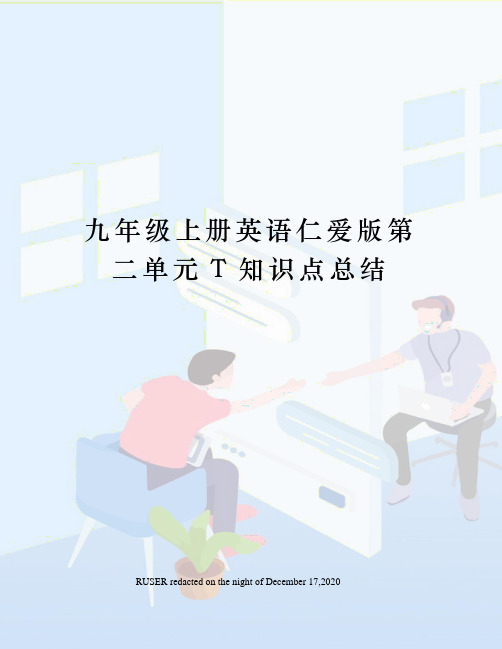
九年级上册英语仁爱版第二单元T知识点总结 RUSER redacted on the night of December 17,2020九年级上册仁爱版第二单元T1知识点总结T 1一、常用词组Pour…into 倒入My goodness 我的天啊Cut down 砍到In a bad mood 心情不好By the way 顺便提一下Write to……给某人写信Care for 关心Be harmful to 有害的A kind of 一种Go deaf 变聋Quite a few 不少的Hearing loss 听力丧失No better than 和……(几乎)一样坏65-year-old people 65岁的人In public 在公共场合Do great harm to 多……有很大的伤害Try to do 尽力做某事Be bad for 对……有很大的伤害High blood pressure 高血压As well 也二、重点句型1.Oh, what a ________ !2.There are several chemical factories_____ waste water into the stream.3.What’s______, the factory makes too much noise……4.Noise is_____, to human’s health.5.People who work and live in noisy conditions often_______ deaf.6.…many teenagers in America can hear no ______ than 65-year-old people do,…7.…does great_____to people’s hearing.三、语法知识1.一般过去时:I went there two years ago.2.Lots of=a lot of3.Sounds great! 听起来不错!4.What a mess! 真糟糕!5.Go vi. 不复存在,不见了,丢失,失窃The flowers and grass here gone!My new bike has gone!6.What a shame!=what a pity! 真遗憾!7.There be+sb/sth+doing sth 有某人或某物正在做某事There be sth/sb to do sth 有某人/某物做某事There are two people waiting outside.There is no time to think.There were few machines to help us to do farm work in the past.8.Waste adj.废弃的,无用的,丢弃的n. 浪费,废弃物A waste of time 浪费时间 waste one’s words 白费口舌9.Breathe v. 呼吸 breath n.Breathe in 吸入 breathe out 呼出 hold one’s breath 屏住呼吸take a deep breath 深深地吸一口气10.How long 多久以后 for/sinceHow soon 多久以后 in+一段时间How often 频率 once/twice a weekHow far 多远(距离)米(单位)11.Produce 产生,造成,引起,表结果(侧重工业生产,农产品,也包括创造脑力劳动产品)Make含义广泛,没有具体限制生产任何产品12.What’s worse 更糟糕的是13.Too much 太多+un. There is too much water leftMuch too 实在太,非常,常用在adv或adj前面14.Bear v. 承受,忍受She can’t bear to watch them suffer.Bear n.熊,鲁莽的人He is a perfect bear. 他是一个十足的鲁莽汉。
仁爱英语九上U2T1

1.我的自行车不见了。
我找不到它了go2.看,有个小女孩正在街上哭。
There be sb doing3.请把糖倒入杯子。
Pour...into4.请不要浪费水。
Waste5.我们呼吸新鲜的空气。
Breath6.他离开家,深深吸了一口气。
Take a deep breath7.这位作家每年写一本新的小说。
Produce novel8.母鸡生产鸡蛋。
Produce hen9.他今天心情很差。
In a bad mood10.我受不了这疼痛。
Cannot bear sth \doing sth11.这么迟睡觉,我受不了。
Cannot bear sth \doing sth sta y up 12.我希望你能来,因为你对我来说很重要。
Hope +从句13.我希望在聚会上看见你。
Hope to do14.不是所有的人都爱打篮球。
Not everybody15.我的朋友中没有一个人喜欢游泳。
None16.贝多芬在他五十岁时候丧失了听力。
Lose one’ hearing17.这个地区居住着许多老年人。
Quite a few18.他的作文和我的一样差。
No better than19.在太阳地下读书对眼睛有害。
Do harm to20.抽烟对身体有害。
Be harmful to21.包括我自己在内,有十个人出席会议。
Present; including。
仁爱版英语九年级上册Unti1---Unit2 考点复习总结

仁爱版英语九年级上册考点(unit 1-unit 2)【教材回归 考点过关】1.have/has been to 表“曾经去过某地”(去而复返)区别:have/has gone to 表“已经去某地了”如: I have been to Shanghai.(去过上海,已经回来)He has gone to Shanghai.(去上海了,不在此处)2.have (no) time to do sth 做某事(没)有时间Tom is busy helping his mother with housework, he has no time to play with you. 汤姆忙于帮助妈妈做家务,他没有时间和你玩3.What’s the population of...? 对人口提问=How large is the population of ...What’s the population of China? 中国的人口是多少?How large is the population of China?注:人口不能用many/much 修饰,但是how many people 对多少人提问这样是可以的。
How many people are there in China?=What’s the population of China? 4.What do you mean by sth.?某物是什么意思呢?= What’s the meaning of sth.? = What does sth.mean?如:What do you mean by the word? 这个单词是什么意思?= What’s the meaning of the word?= What does the word mean?5.----How long have you been like this? 你处于这样的状态多久了?---- I have been like this since last month.自从上个月以来我一直这样。
仁爱版英语九上U2T1Sb

仁爱版英语九上U2T1Sb概览本文档将介绍仁爱版英语九上U2T1Sb课程的内容,包括课本的主要内容、教学目标、教学方法以及相应的学习资源。
课本内容课本名称:Unit 2 Travel课题:Task 1 Using the Simple Past Tense课本中的Task 1是关于运用简单过去时的练习。
任务要求学生完成一篇关于自己或他人过去旅行经历的短文。
教学目标在完成本课任务后,学生应能够:1.运用简单过去时的规则和用法,描述过去的旅行经历;2.通过撰写短文,提高写作技巧和语法运用;3.提高阅读理解能力,学习他人的旅行经历。
教学方法1. 交流与讨论通过师生互动和小组讨论,引导学生探讨过去的旅行经历。
2. 阅读与理解引导学生阅读课本中给出的范例短文,并提出相关问题帮助学生理解文中的词汇和语法。
3. 写作练习学生根据自己的过去旅行经历或他人的旅行经历,撰写一篇与任务相关的短文。
4. 反思与分享学生互相阅读彼此的作文,并给予反馈和分享。
学习资源为提高学生的学习效果,以下是一些在线学习资源推荐:1.仁爱版英语九上教材及练习册;2.仁爱版英语九上U2T1Sb相关课件和学习视频;3.在线英语学习平台,如Duolingo和Memrise,提供互动练习和词汇记忆工具;4.在线语法学习网站,如Grammarly和EnglishClub,提供对简单过去时的深入学习和练习。
结语通过本文档,我们详细介绍了仁爱版英语九上U2T1Sb的主要内容、教学目标、教学方法以及相应的学习资源。
希望本文档能对您的学习和教学有所帮助!。
仁爱英语九年级上册U1T1SB
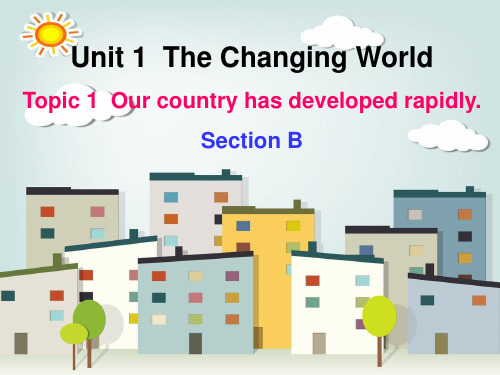
Activity clean
rooms Name
jump rope
chat fly a kite do farm …
online
work
Ann
Zhang Yang
…
Example:
A: Has Ann ever cleaned rooms?
B: Yes, she has.
A: Has Ann chatted online?
B: No, she hasn’t.
1b Listen to 1a and mark T (True) or F (False).
1. Maria helped the disabled children to ( )
clean the rooms and fed them.
2. Maria thinks her experience as a
Unit 1 The Changing World
Topic 1 Our country has developed rapidly. Section B
温故而知新 Review
上节课作业回顾: 自主学习:比较一般过去时和现在完成时的不同
用法。
可参考语法书等其他工具书
学习新知
短语、句型积累
them aloud and paTyheatptreonntuinocniattoionthoef “uendd” eisrl“i/nt/,e/dd/p, oarrts. T” hwehnen listen and check. it is added to the verbs ending with different
sounds, such as help/jump, play/turn or wait/end.
仁爱版九年级英语上册U2T1SB优质教案

SectionBⅠ.Materialanalysis本课是九年级第二单元第一话题的第二课时,主活动是1a和3a。
1a通过Mrs.Zhou讲述自己的身体状况和生活环境,引出污染对人们的健康和生态环境所产生的危害,同时也道出了污染产生的原因。
1b通过“听—回答问题—再听—核对答案”的模式来训练学生的听力技能。
2与1a形成很好的呼应,通过康康向报社反映西山污染情况的信件,呼吁政府和大众关注环境问题,要求学生掌握词性的转换,强化1a中的语言知识。
3a和3b通过图片和简介来描述不同种类的污染以及带来的危害。
在学习这些污染的同时,也兼顾了单词的重读,句子的连读、停顿及语调等语言知识。
通过学习本课,引导学生关注环境问题,了解各种污染类别以及带来的危害,树立正确的环保意识。
Ⅱ.Teachingaims1.Knowledgeaims:掌握本课的重点词汇和短语,正确运用现在完成时进行问答。
2.Skillaims:能通过观察课文插图来预测课文内容。
能听懂用现在完成时表达的对话。
能朗读和表演有关环保的对话。
能正确运用连读和停顿的技巧,使发音流畅,富有韵律感。
3.Emotionalaims:(optional)引导学生关注环境问题,树立绿色环保意识,增强忧患意识和社会责任感。
4.Cultureawareness:(optional)通过谈论环境问题,让学生了解不同种类的污染及其危害。
Ⅲ.Thekeypointsanddifficultpoints1.Keypoints:Wordsandphrases:pain,produce,awful,bear,harmful,chest,editor,breathe/breath,soil getapainin…,what’sworse,toomuchnoise,t oomanyproblems,breathingproblem,beharmfulto,ma keamessof,throw…aroundSentences:It’sdifficultformetobreathe.I’vegotapaininmythroat.It’sreallyawful.A:Howlonghaveyoubeenlikethis?A:Haveyouseenadoctor?B:I’vebeenlikethissincela stweek.B:Notyet.Grammar:PresentPerfect的问答。
仁爱版九年级上册U2T1词组句子集锦双语版

U2TI词组句子集锦汉语版SA词组1.计划野炊2.许多,大量3.看见某人或某物正在做某事4.进行野炊SA句子1.我们去哪里好呢?2.听起来真棒!3.一团糟!4.花和草已经消失了!5.难闻!6.这里已经发生了什么?7.多可惜啊!8.有几家化工厂正在向小溪里排放污水。
9.一切都已经变化了。
10.当然不想。
11.人们已经砍倒了太多的树。
SB词组1.看起来虚弱。
2.…部位疼痛3.看病4.产生难闻的气体5.更糟糕的6.太多的噪音7.睡好觉8.在夜里9.情绪不好10.解决这个问题11.顺便问一下12.死鱼13.导致太多的问题14.给…写信15.关心16.土壤污染17.水污染18.噪音污染19.空气污染20.垃圾21.光污染22.太多使用…23.呼吸问题24.太多的噪音污染25.对…有害26.浪费能量27.使…一团糟28.乱扔SB句子:1.你怎么了?2.我喉咙疼痛。
3.你像这样多长时间了?4.你已经看病了吗?5.那太糟糕了。
6.真地糟糕!7.我经常情绪不好。
8.污染已经导致了太多的问题。
9.你最好去看病。
10.什么导致了这些问题?11.我们夜里睡不好觉。
12.人们应该关心这些问题。
13.人们在田里使用太多的化学药品。
14.土壤污染导致不健康的食物。
15.人们把污水排放入河流胡泊,因此,水污染在中国到处都是。
16.空气污染导致呼吸问题,甚至癌症。
17.光污染对鸟类有害。
18.垃圾使我们的环境一团糟。
19.我们不应当乱丢垃圾。
SC词组1.在当今世界2.几乎每个人3.对…有害4.并非所有的人5.人类健康6.在噪音环境中7.变聋8.例如9.丧失听力(两个)10.相当多11.与…一样糟糕12.65岁的人13.听流行音乐14.制造大的噪音15.在公共场合16.打扰别人17.不仅…而且…18.对…有害19.人的听力20.导致某人做某事21.各种各样的22.环境问题23.把…放在…上24.伤害人的健康25.…的听力26.与某人分享某物27.据报道…SC句子1.并非所有人的都知道噪音也是一种污染,并且对人类健康有害。
仁爱英语九上词组框架--U1-U2 T3

Unit 1 Topic 1Section A1 developing country 发展中国家2 developed country 发达国家3 have a good summer holiday .过个愉快的暑假4 see sb do sth . 看到某人经常做某事see sb doing sth 看到某人正在做某事5 work for sb . 为某人工作、效力6 feel sorry f or …... 对…感到抱歉/难过/同情7 so……that. 如此……以至于….8 There goes the bell = The bell is ringing铃声响了9 come back from = return from 从……回来10 in one place 在某个地方11 a proper place to do .sth 做什么某事的恰当地方12 have been to sw 去过某地,已回13 have gone to sw 去了某地,未回14 improve my English 提高/改善我的英语Section B1 take part in sth 参加….2、social activities 社会活动3 during summer holidays 暑假期间4 be a volunteer in … 在…… 做志愿者5 a disabled children’s home 残疾儿童之家6 tell a story to sb =tell sb a story 给某人讲故事7 feed sb 喂某人8 a wonderful experience 一次精彩的经历9 learn sth from sb 向某人学习…..10 have no time to do sth 没空做某事11 chat on line 网上聊天12、do farm work. 做农活13、ride s skateboard 玩滑板14 have/live a hard life. 过着艰苦的生活15、describe sth in detail. 详细地描述16、can afford sth 能够负担起,买得起17、enough food . 足够食物Unit 1 Topic 2Section A1 not any more =no more 不再2 get lost 迷路3 bad luck 倒霉4 call sb up = ring sb up 打电话给某人5 hate to do sth 讨厌做某事6 European country 欧洲国家7 such a beautiful place 那样美丽的地方8 So do I 我也一样9 a photo of …的一张照片1 what’s the population of …= how large is the population of …? 某地人口多少?2 the population of ..is= have a population of … 某地人口有多少?3 increase by 以…幅度增长4 increase to 增长到….5 have a large population 人口众多6 it shows that 这表明了7 what’s more 而且8 carry out the policy 实施这个政策9 control the population 控制人口10 developing country 发展中国家11 developed country 发达国家Section C1 half of 一半2 one quarter of 四分之一3 three quarters of 四分之三4 one fifth 五分之一5 because of 因为Unit 1 topic 3 section A1 have been in 呆了多久(用于完成时态2)2 How do you like sth /doing sth ? 你认为..怎样?=what do you think of sth /doing sth ?3 hear that .... 听说4 hear of sth 听说某事5 get/be used to doing sth 习惯于做某事6 used to do sth 过去常常做某事7 be used to do sth 被用来做某事8 imrove a lot 改善了许多9 in the past 在过去10 as a matter of fact = in fact 事实上11 a wonderful place to live 一个居住的好地方12 go to plays 去看话剧13 come for a visit 来看一下14 see .... for oneself 亲眼看见Section B1 show sb sth=show sth to sb 给某人看某物2 return to 回到…..3 live a normal life 过上正常的生活4sound great 听起来好极了5 once …… 一旦……6 people in need 需要帮助的人们7 decide on sth 决定/ 选定…8 medical treatment 医学治疗9 provide sb with sth = provide sth for sb为某人提供某物10 so that 以便,为了11 it is …for sb to do sth 对某人来说做某事…12 feel good about oneself 自我感觉良好13 in order to do sth 为了做某事14 be away from 离开…….Section A1 interview sb about sth 就某事采访某人2 environmetal protection 环境保护3 spread the messgae about…传递关于…的信息4 reduce the waste 减少废品5 both sides of 两面6 reuse plastic bags再利用塑料袋7 not only…but also…. 不但…而且…8 soft drink cans 软饮料罐9 so that 以便10 it is kind of sb to do sth 某人做某事太善良了11 be (not) supposed to do sth (不)应该做某事Section B1 would like to do sth 想要做某事2 ought (not)to do sth (不)应该做某事3 had better (not)do sth最好(不要)做某事4 instead of 代替,而不是5 travel a short distance 短距离旅行/行走7 cover all the pans 盖住锅8 have one’s attention 请某人注意9 take part in sth /doing sth 参与某事10 on time 按时11 in time 及时12 sort the garbage 将垃圾分类13 hard work 艰苦的工作14 make sure that … 确保,务必,一定15 can be recycled 可被回收利用Section C1 produce electricity 发电2 nuclear energy 原子核能3 all the time 一直4 renewable energy 可再生能源5 everyday life 日常生活6 electric vehicle 电动汽车7 in the 1990s 在二十世纪九十年代8 cost very little =very cheap 非常便宜9 run for long 长时间运行10 there will be an increase in…..needs在…需求上有所增长11 energy efficient 高效节能12 reach a top speed of ……per hour达到最高时速…..13 by doing sth 通过做某事14 burn the garbage 燃烧垃圾15 power station 发电站16 be used for doing sth 被用来做某事= be used to do sthSection D1 turn green 变得环保2 do what sb can to ….. 做某人能做的来…..3 take a shower 淋浴4 make a short journey 短途旅行5 How often….?隔多久….?6 paper towels 纸巾7 reused plastic bags 重复利用的塑料袋8 stop sb from doing 阻止某人做某事9 cry for help 呼喊求救10 offer sb sth = offer sth to sb给某人提供某物。
仁爱初中英语九年级上册精品教案设计U1T3SB
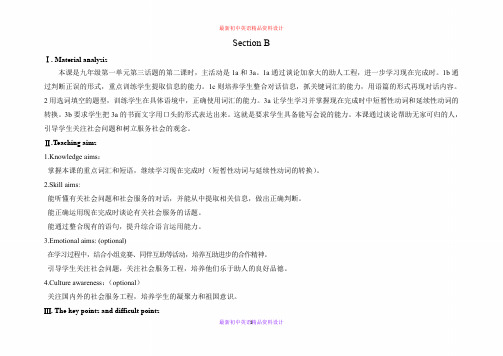
最新初中英语精品资料设计1 Section BⅠ. Material analysis本课是九年级第一单元第三话题的第二课时,主活动是1a 和3a 。
1a 通过谈论加拿大的助人工程,进一步学习现在完成时。
1b 通过判断正误的形式,重点训练学生提取信息的能力。
1c 则培养学生整合对话信息,抓关键词汇的能力,用语篇的形式再现对话内容。
2用选词填空的题型,训练学生在具体语境中,正确使用词汇的能力。
3a 让学生学习并掌握现在完成时中短暂性动词和延续性动词的转换。
3b 要求学生把3a 的书面文字用口头的形式表达出来。
这就是要求学生具备能写会说的能力。
本课通过谈论帮助无家可归的人,引导学生关注社会问题和树立服务社会的观念。
Ⅱ.Teaching aims 1.Knowledge aims :掌握本课的重点词汇和短语,继续学习现在完成时(短暂性动词与延续性动词的转换)。
2.Skill aims:能听懂有关社会问题和社会服务的对话,并能从中提取相关信息,做出正确判断。
能正确运用现在完成时谈论有关社会服务的话题。
能通过整合现有的语句,提升综合语言运用能力。
3.Emotional aims: (optional)在学习过程中,结合小组竞赛、同伴互助等活动,培养互助进步的合作精神。
引导学生关注社会问题,关注社会服务工程,培养他们乐于助人的良好品德。
4.Culture awareness :(optional )关注国内外的社会服务工程,培养学生的凝聚力和祖国意识。
Ⅲ. The key points and difficult points1. Key points:Words and phrases: program, manage, training, secretary, helper, club, engineer, wound, homeless, treatment, immediately, helper homeless people, live a normal life, decide on sth., medical treatment, provide sth. for sb./ provide sb. with sth., feel goodabout themselvesSentences: (1) Once they find people in need, they decide on suitable ways to help them.(2)The program also provides them with houses.Grammar: Go on learning the present perfect tense with “for” or “since” and find out the differences between the present perfect tense and the simple past tense.2. Difficult points:能在具体语境中,将短暂性动词转换成延续性动词,正确使用一般过去时和现在完成时。
- 1、下载文档前请自行甄别文档内容的完整性,平台不提供额外的编辑、内容补充、找答案等附加服务。
- 2、"仅部分预览"的文档,不可在线预览部分如存在完整性等问题,可反馈申请退款(可完整预览的文档不适用该条件!)。
- 3、如文档侵犯您的权益,请联系客服反馈,我们会尽快为您处理(人工客服工作时间:9:00-18:30)。
2. Work alone
No. I’m feeling even worse.
What did they say next? Maria: . Kangkang: The journalist asked Mrs. Zhou 1 whether/if she .was feeling better then. Mrs. Zhou said that she was feeling even worse.
时间状语
• • • • • • • 直接引语 间接引语 now → then today → that day tonight → that night this week → that week yesterday → the day before the day before → two days before yesterday • two days ago → three days before
produce
product
chest anyway gas
air pollution
water pollution light pollution noise pollution
1.What does the chemical factory produce? • It produces terrible gas. 2.What problems does the chemical factory cause for Granny? The bad air makes her chest hurt. The factory makes too much noise and she can’t sleep well at night. She is always in a bad mood because she can’t stand the environment there.
Homework
• 1. 《新课堂》page 28 Ⅲ 1,2,3 • 2. 把Section B 1a 的 课文全部变成间接引语
• weak
weakness
adj. 弱的,差的 弱的, n. 弱点,缺点 弱点, v. 生产,制造 生产, n. 产品 n. 胸部,箱子 胸部, adv. 不管怎么样 n. 气体,煤气 气体,
Do you have any suggestions for the government, Mrs. Zhou?
2. Work alone
the Yes. I hope 5 government will solve this problem.
Maria:
What did they say at the end of the whether/if she had interview? any suggestions . The journalist asked Mrs. Zhou 4
for the government.
Kangkang: Mrs. Zhou told the journalist that she hoped the government would solve that problem soon.
时态变化: 时态变化: 主现从现, 主现从现,主过从倒退 时间状语,地点状语,人称变化 时间状语,地点状语, 疑问句变化: 疑问句变化: 一般疑问句从句用if +陈述句 一般疑问句从句用if / whether +陈述句 特殊疑问句从句照搬, 特殊疑问句从句照搬,与主句时态呼应
• 1.Kangkang: What’s wrong with been like this? • 3.Kangkang: Have you seen a doctor?
Are you feeling better now, Mrs. Zhou?
• • • • • •
直接引语 一般现在时 一般过去时 一般将来时 现在进行时 现在完成时
间接引语 一般过去时 过去完成时 过去将来时 过去进行时 过去完成时
• 1.Granny: The chemical factory produces terrible gas. • 2.Granny: The factory makes too much noise and I can’t sleep well at night. • 3.Granny: I’ve been like this since last week. • Granny said that…
时间、 时间、地点状语
• 直接引语 • last week • tomorrow • next week • here • this • these
指示代词
间接引语 the last week the next day the next week there that those
1.He said to me, “You can sit here.” I could sit there He said to me that __________________. 2.“I met her yesterday,” he said to me. he had met her the He said to me that __________________ day before ____________. 3.The teacher said, “The sun rises in the east and goes down in the west.” The teacher said that the sun ______ rises in the east and goes down in the west. ____ 若直接引语为客观真理 客观真理,则变为间接引语时 客观真理 时态不变。 时态不变
What is the environment around this place like?
2. Work alone
3 The chemical factory produces terrible gas and the bad air makes my chest hurt. what Maria: What did they say next? was the environment around The journalist asked that place like. . 2 Kangkang: Mrs. Zhou said that the chemical factory produced terrible gas and the bad air made her chest hurt.
Section B
• Kangkang: It’s a beautiful place with lots of flowers and grass. • Direct speech: Kangkang says, “It’s a beautiful place with lots of flowers and grass.” • Indirect speech: Kangkang says that it’s a beautiful place with lots of flowers and grass. • Kangkang said that it was a beautiful place with lots of flowers and grass.
